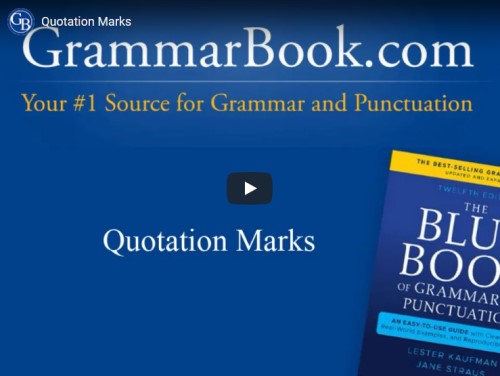|
Having trouble viewing this message? Click here to view it online.
To unsubscribe or change contact details, scroll to the bottom and follow the link.
|



|
Present Progressive Tense
|
|
English uses the concept of tense to communicate an action's place in time. For example, in the sentence James threw the ball to first base, the infinitive verb “to throw” is written in the past tense to let us know that this action occurred in the past as opposed to the present or the future.
The tenses have both progressive and nonprogressive forms to further specify a tense's action as well. Compare the following sentences:
James is throwing the ball to first base.
James throws the ball to first base. |
Each sentence gives us a nuanced idea about the timing of the action. The first sentence (progressive) tells us that the action is happening at this moment. In the second sentence (nonprogressive), the action could be instant, but we are not certain if it is happening now. The nonprogressive could be used to tell a narrative in the present tense even though the action is not presently taking place.
English uses the present progressive tense for actions that are happening now, that are simultaneous or in continual progress, or that will occur in the future (often soon). In our examples above, we know the sentence James is throwing the ball to first base is in the present progressive because it communicates an action that is happening now.
Let's look at some more examples of sentences written with the present progressive:
Danielle is trying to get there on time while (she is) driving the speed limit. (The action is happening now; the text “she is” is enclosed to indicate it can be omitted as understood.)
When I am in the basement, I am usually lifting weights. (two actions at the same time)
You are studying for an MBA. (action in progress beyond the present moment)
I am starting a new job tomorrow. (The action will occur soon.) |
Forming the Present Progressive Tense
You might have already started to notice a pattern or tendency in how the present progressive is written: e.g., is trying, am lifting, are studying.
The present progressive is formed with a present-tense conjugation of the verb to be (am, is, are) followed by the present participle of the main verb. The present participle is simply the verb plus the ending -ing: trying, lifting, studying.
For verbs that end in -e, we remove the e and add -ing: hike > hiking, ride > riding. If the verb ends in -ie, we remove the ie and add y plus -ing: lie > lying, vie > vying.
If the verb has a single or final syllable that is consonant-vowel-consonant, we double the last consonant and add -ing: drum > drumming, sublet > subletting.
Examples
Stephanie is trying to teach herself Spanish.
We are hiking in Big Bear Valley next week.
The two teams are vying for the football conference championship.
It seems like Thomas is always drumming his fingers on the table. |
Present Progressive Passive Tense
The present progressive tense can also be expressed in the passive voice. The present progressive passive is formed with a present-tense conjugation of the verb to be (am, is, are) followed by the present participle of the verb to be (being) and the past participle of the main verb.
| verb |
present tense to be |
present participle to be |
past participle main verb |
| to see |
am |
being |
seen |
| to study |
are |
being |
studied |
| to test |
is |
being |
tested |
Examples
I am being seen by a doctor next month.
Those rocks are being studied by geologists.
The new mouthwash is being tested by a focus group. |
Related Topics
What Is a Past Participle?
Expressing Possession of Gerunds
Present Perfect Tense
|
View and comment on this
article on our website.
|
|
|

|
Pop Quiz
Form the verb in each sentence into either the present progressive tense or the present progressive passive tense as indicated.
1. The vintner (to produce) two new varietals this year. (present progressive)
2. You (to go) to New Zealand for an apprenticeship after graduation, correct? (present progressive)
3. The old farmyard (to overrun) by stray coyotes. (present progressive passive)
4. I (to try) rock climbing as a new way to push my endurance. (present progressive)
5. The terms (to set) in the last round of negotiations. (present progressive passive)
|
 |
The Blue Book of Grammar and Punctuation
by Lester Kaufman and Jane Straus |
The Authority on English Grammar! Twelfth Edition Now Available
An indispensable tool for busy professionals, teachers, students, homeschool families, editors, writers, and proofreaders.
Available in print AND as an e-Book! Over 2,000 copies are purchased every month!
To order the book, simply click the link to order the book from the GrammarBook.com website.
|
Free BONUS Quiz for You!
Friend, because you are a subscriber to the newsletter, you get access to one of the Subscribers-Only Quizzes. Click here to take a Good vs. Well Quiz and get your scores and explanations instantly!
We will be adding many more quizzes this year to our already substantial list of them. If you have suggestions for topics we have not yet covered, please send us a message at help@grammarbook.com.
|
Hundreds of Additional Quizzes
at Your Fingertips
Subscribe now to receive hundreds of additional English usage quizzes not found anywhere else!
Teachers and Employers
Save hours of valuable time! You may assign quizzes to your students and employees and have their scores tallied, organized, and reported to you! Let GrammarBook.com take the hassle out of teaching English!
"Fun to test my skills."
"The explanations really help ... thanks!"
"I can select the quizzes to assign to my students, and then the results are reported to me automatically!"
99¢
QUIZZES
|
Don't need all the quizzes?
You can now purchase the same quizzes individually for ONLY 99¢ each.
Purchase yours here.
|
If you think you have found an error in a quiz, please email us at help@grammarbook.com
|
Wordplay

Pop Quiz Answers
1. The vintner is producing two new varietals this year.
2. You are going to New Zealand for an apprenticeship after graduation, correct?
3. The old farmyard is being overrun by stray coyotes.
4. I am trying rock climbing as a new way to push my endurance.
5. The terms are being set in the last round of negotiations.
|
 |
English In A Snap:
68 One-Minute English Usage Videos FREE |
Learn all about who and whom, affect and effect, subjects and verbs, adjectives and adverbs, commas, semicolons, quotation marks, and much more by just sitting back and enjoying these easy-to-follow lessons. Share them with your colleagues (and boss), children, teachers, and friends as well! Click here to watch.
|
|